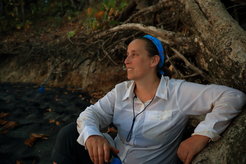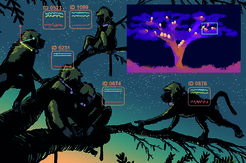Meg Crofoot wins ERC grant for investigating collective sleep
The prestigious award from the European Research Council will support a revolutionary approach to the study of sleep in wild, group-living animals
Meg Crofoot, Director of the Department for the Ecology of Animal Societies at the Max Planck Institute of Animal Behavior and an Alexander von Humboldt Professor at the University of Konstanz, has won an ERC Consolidator Grant in the amount of € 2,900,000 for a project that is set to change the way the scientists study and think about sleep in wild animals. Crofoot is one of 313 overall winners, and one of 95 in the Life Sciences, of the 2021 ERC Consolidator Grants, which support excellent Principal Investigators in pursuing ground-breaking and ambitious scientific projects. Consolidator Grants are awarded up to a maximum of € 2,000,000 for a period of 5 years, with an additional € 1,000,000 for “start-up” costs, such as equipment or fieldwork.

CO-SLEEP – Sleep as a collective behaviour
How do group-living animals overcome conflicts of interest to achieve shared goals? How do groups make decisions, and are there universal rules by which animal societies organize themselves? These are some of the questions Meg Crofoot addresses in her research. With her ERC-funded CO-SLEEP project, she aims to change the way we think about and study sleep. “Animals that live in groups don’t sleep in isolation, but because most sleep research is conducted in laboratory settings, almost nothing is known about the social dynamics of sleep,” Crofoot explains.
Her CO-SLEEP project explicitly aims to bring the study sleep behavior into a collective context. "My goal is to understand how social environments shape – and are shaped by– the sleep patterns of their members. To achieve this, we have to take sleep research out of the lab and into the field," she says.
Fieldwork using state-of-the-art technology
To do this, Crofoot and her team will combine traditional field-observation methods with cutting-edge technologies for their studies on wild baboons in Kenya. These technologies include collars with GPS transmitters and acceleration sensors that record the movements of individual animals, as well as thermal imaging cameras for behavioral monitoring at night. In this way, the movement patterns and sleeping behaviour of 30 baboon troops – about 900 individuals – will be studied at the same time; an unprecedented scale for such a field study.

Using advanced computational modelling, the researchers will then analyse the collected data to explore how complex social relationships shape individual and collective sleep decisions, and how these, in turn, interact with social dynamics. "The project has the potential to provide entirely new insights into the social and ecological trade-offs that gregarious species – like us – must make to satisfy their essential need for sleep," she says.













